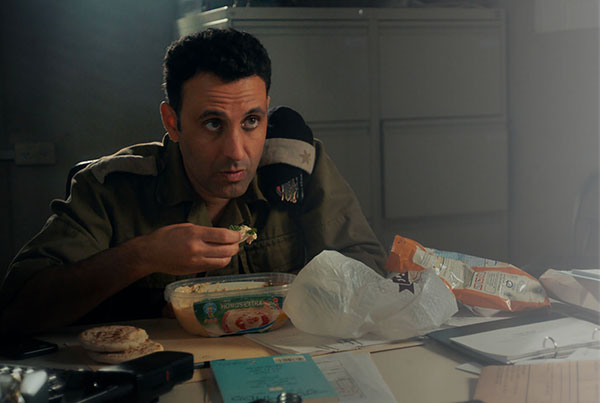Tel Aviv On Fire
Houmous fever
Film. Sameh Zoabi’s comedy ingeniously mixes humour and an involved look over the Israeli-Palestinian conflict. Explanations.
By Valentine Bounaud
![]() Reading time 3 min.
Reading time 3 min.
Anyone watching Tel Aviv On Fire is craving for hummus. But Sameh Zoabi’s film has much more to offer. The story is about Salam’s daily life (Kais Nashif), young Arab Israeli intern on the set of the soap opera called Tel Aviv On Fire, shot in Ramallah, in the east of Palestine. He has to cross a check-point everyday to go to work and one day, he’s arrested by Assi (Yaniv Biton), the Israeli officer in charge of the check-point, and also a huge fan of the serie whose Salam claims to be the scriptwriter. It’s the starting point of several absurd and nuts situations, because Salam is forced by Assi to change the script. A not-so-absurd story when one knows that Dancing Arabs, a serie made by the Arab Israeli journalist Sayed Kashua, has been one of the most popular Israeli TV shows of the 2000’s.

Tel Aviv On Fire goes beyond comedy to become a political film
Their daily meetings are an opportunity for delicious conversations between a occupier who’s too determined and an occupied who’s melancholic, which creates a strong and funny alchemy. Like the combination of soap opera’s scenes et real life’s scenes with a different colorimetry. The TV show’s sharp tones contrast with reality’s colourless tones. This mix of points of view gives the film two political dimensions. The one of the Six-Day War as it is described in the show and depicted by Bassam (Nadim Sawalha), creator of the show. And the one of the actual check-points’ reality.
Then Tel Aviv On Fire goes beyond comedy to become a political film. But the Palestinian director (noticed in 2012 with Téléphone Arabe) gathered an international casting (Kais Nashif is actually Arab Israeli, Yaniv Biton Israeli, Nadim Sawalha Jordanian and the leading actress Lubna Azabal, Belgian). Together they try to deliver a toned look over the conflict. Hoisted on his own petard, Salam will realize the cohabitation is only possible if the two peoples are equal. What’s truly amazing about this film lies precisely in this balance of points of view and explains why it received the great Prize in Haïfa’s International Festival in 2018.
- Tel Aviv
- Sameh Zoabi
- great Prize
- Haïfa’s international Festival
See also
